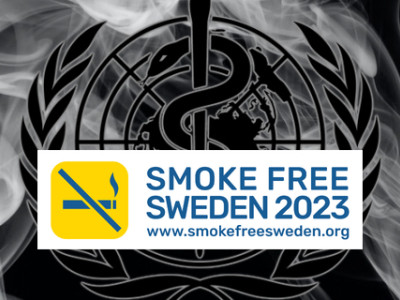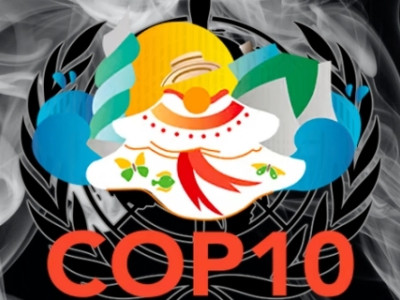“We all know about the health risks associated with smoking, but Fake Britain has discovered that some e-cigarettes could be harmful in an entirely different way,” began Matt Allwright. “It needs to be recharged to use it. This certificate states that the brand named on it is safe to use – but the certificates are fake. The product named may not be safe. And that’s just the start of the story...”
It is possible to forgive the misquoted figure of 2.1million users; Robert West’s latest research says there are now 2.8million. But, all too predictably, we see the YouTube footage of a barmaid near an exploding ecig that was being incorrectly recharged. The focus of the tale for the BBC is the false confidence being given to products.
The program claims: “many of the popular brands of e-cigarette have this (SGS) safety mark on the back of the pack.” A quick glance at the packaging for the Kanger Subox, the Hcigar VT40 and the Smok X Cube II reveal no such safety mark. It would appear that (although not explicit in the show) they are only referring to cigalike and eGo-type products.
We meet Tracy Joiner, ex-smoker, ex-cigalike user and victim: “These e-cigarettes was a godsend.” She went to her local newsagents and bought a popular but unnamed brand that goes on to be pictured in her hand later in the show.
“Yer, I’ve heard of that make, it’s supposed to be a good make. So I paid me twenty quid, got me e-cigarette and like I came home that night and charged it up,” explained Tracy.
Matt says she followed the instructions on the packaging, as the camera cuts to something being plugged into a laptop. The voiceover continues: “And then she went to bed. But an hour later she was woken up with a burning sensation in her foot.”
“Me bedroom were going up in flames. Ran to the bathroom...and I were chucking water everywhere trying to put the fire out then I rung fire brigade. This room (bedroom) were gutted, the landin’, the bathroom...I was lucky to get out alive.”
While the small circular scorch mark being shown on screen lies at odds with the tale of blazing devastation, the brand in use ought to have been one that gave explicit instructions for safe use and charging.
The fire brigade confirmed that it was a popular brand across the country, available in supermarkets, newsagents and petrol stations – the packaging of which carried the SGS logo. The program claims that this logo assures vendors and consumers that it is a rigorously tested product. It is possible many have not heard of SGS or paid much attention to the logos on packets and boxes...but this product was clearly not SGS compliant for it to fail in such a manner.
Steve Elliot, head of SGS corporate security: “On of the very few products that we do not test just so happens to be electronic cigarettes. And we’ve made that decision globally; we’ve decided not to be involved in that market. We don’t test any electronic cigarettes, anywhere in the world, so it is very clear to us where we see our name appearing on packaging, and where it appears those products have been tested by us, that advertising is false.”
SGS contracted Lella Balmer, a researcher specialising in online fraud, to investigate the extent of the problem. She discovered a cloning industry, “the scale of which was astonishing!” There will be few advanced vapers who are surprised at China’s involvement with fakery.
Mark Hazelton, London Fire and Emergency Planning Authority, is reviewing the national services policy on electronic cigarettes. “There have now been seventy fires attributed to these smoking products and eleven of those have resulted in injuries. We now know that there has been one fire fatality.”
Stephen Curtler, the Electrical Safety Council’s Product Safety Manager, blames the poor quality of batteries for the spate of fires. “Anything slightly higher than they should be charged at will overheat the battery and cause an explosion,” he said. He demonstrated the results of one of his recent tests on a product bearing the SGS logo.
Steve Elliot wants all of these products removed from shelves. The program approached ECITA and spoke to Katherine Devlin about their findings, findings that included the revelation that an ECITA member was misusing the SGS safety mark. Devlin agreed said that it “may” be appropriate for sellers and companies to withdraw stocks bearing the SGS logo from the market but didn’t go as far to say they must be. She did say that ECITA expects all members to withdraw any product bearing the mark.
The company concerned are believed to be blu eCigs, now owned by tobacco company Imperial, who proudly wrote in their blog: “We engage independently approved laboratories to ensure we meet these exacting regulations – SGS in China and Intertek in the UK. In China, SGS tests products for compliance with Restrictions on Hazardous Substances regulations (“RoHS”). It also issues a CE certificate to confirm that all product parts are compliant with the CE directive. You will find this in your Premium kit. SGS also provides a Material Safety Data Sheet (“MSDS”) for the relevant products.”
As previously quoted, SGS do not and have never operated in the electronic cigarette market. There is no longer any reference to SGS on blu’s certifications page. The ecig being held at the end of the program bears a striking similarity to a blu product.
While most vapers will not be concerned about shenanigans in the cigalike world this does raise questions about the quality of information being given to cigalike users regarding charging. With the implementation of the TPD currently being debated in parliamentary committee, it also brings into question ECITA’s role and motivations due to having a Big Tobacco company as a member.
Dave Cross
Journalist at POTVDave is a freelance writer; with articles on music, motorbikes, football, pop-science, vaping and tobacco harm reduction in Sounds, Melody Maker, UBG, AWoL, Bike, When Saturday Comes, Vape News Magazine, and syndicated across the Johnston Press group. He was published in an anthology of “Greatest Football Writing”, but still believes this was a mistake. Dave contributes sketches to comedy shows and used to co-host a radio sketch show. He’s worked with numerous vape companies to develop content for their websites.
Join the discussion
Harm Reduction For The Rich
The United Kingdom risks becoming a harm reduction country only for the wealthy, according to Michael Landl of the World Vapers’ Alliance
CAPHRA Highlights Tobacco Control Flaws
The Coalition of Asia Pacific Tobacco Harm Reduction Advocates highlights the flaws in tobacco control which has led to the rise of black market in Australia
A Missed Opportunity at COP10
The Smoke Free Sweden movement says that COP10 was a missed opportunity to save millions of lives
COP10: Promote Tobacco Harm Reduction
Experts with Smoke Free Sweden are emphasising the urgent need for a Tobacco Harm Reduction approach at COP10












